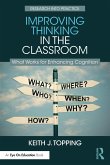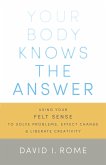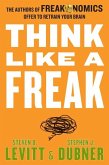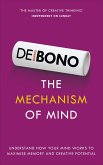Karem Roitman
Seeking the Perfect World
A Critical Discussion of Global Challenges for the Bright and Curious
Karem Roitman
Seeking the Perfect World
A Critical Discussion of Global Challenges for the Bright and Curious
- Broschiertes Buch
- Merkliste
- Auf die Merkliste
- Bewerten Bewerten
- Teilen
- Produkt teilen
- Produkterinnerung
- Produkterinnerung
Seeking the Perfect World guides readers through thoughtful discussions of 21st century challenges while providing everything needed to critically engage with current events and personal dilemmas.
Andere Kunden interessierten sich auch für
![Improving Thinking in the Classroom Improving Thinking in the Classroom]() Keith J. ToppingImproving Thinking in the Classroom25,99 €
Keith J. ToppingImproving Thinking in the Classroom25,99 €![Your Body Knows the Answer Your Body Knows the Answer]() David I. RomeYour Body Knows the Answer21,99 €
David I. RomeYour Body Knows the Answer21,99 €![Think Like a Freak Think Like a Freak]() Steven D. LevittThink Like a Freak11,99 €
Steven D. LevittThink Like a Freak11,99 €![The Innovator's Hypothesis: How Cheap Experiments Are Worth More Than Good Ideas The Innovator's Hypothesis: How Cheap Experiments Are Worth More Than Good Ideas]() Michael SchrageThe Innovator's Hypothesis: How Cheap Experiments Are Worth More Than Good Ideas21,99 €
Michael SchrageThe Innovator's Hypothesis: How Cheap Experiments Are Worth More Than Good Ideas21,99 €![Think Like a Freak Think Like a Freak]() Steven D. LevittThink Like a Freak26,99 €
Steven D. LevittThink Like a Freak26,99 €![The Mechanism of Mind The Mechanism of Mind]() Edward de BonoThe Mechanism of Mind16,99 €
Edward de BonoThe Mechanism of Mind16,99 €![The New Art of Ideas: Unlock Your Creative Potential The New Art of Ideas: Unlock Your Creative Potential]() Robin LandaThe New Art of Ideas: Unlock Your Creative Potential21,99 €
Robin LandaThe New Art of Ideas: Unlock Your Creative Potential21,99 €-
-
-
Seeking the Perfect World guides readers through thoughtful discussions of 21st century challenges while providing everything needed to critically engage with current events and personal dilemmas.
Hinweis: Dieser Artikel kann nur an eine deutsche Lieferadresse ausgeliefert werden.
Hinweis: Dieser Artikel kann nur an eine deutsche Lieferadresse ausgeliefert werden.
Produktdetails
- Produktdetails
- Verlag: Taylor & Francis Ltd
- Seitenzahl: 216
- Erscheinungstermin: 17. Dezember 2024
- Englisch
- Abmessung: 149mm x 230mm x 13mm
- Gewicht: 292g
- ISBN-13: 9781032601892
- ISBN-10: 1032601892
- Artikelnr.: 71304136
- Herstellerkennzeichnung
- Produktsicherheitsverantwortliche/r
- Europaallee 1
- 36244 Bad Hersfeld
- gpsr@libri.de
- Verlag: Taylor & Francis Ltd
- Seitenzahl: 216
- Erscheinungstermin: 17. Dezember 2024
- Englisch
- Abmessung: 149mm x 230mm x 13mm
- Gewicht: 292g
- ISBN-13: 9781032601892
- ISBN-10: 1032601892
- Artikelnr.: 71304136
- Herstellerkennzeichnung
- Produktsicherheitsverantwortliche/r
- Europaallee 1
- 36244 Bad Hersfeld
- gpsr@libri.de
Karem Roitman, Ph.D. (DPhil Oxford) is a lecturer in political philosophy and global development for the Open University and a consultant and public speaker on education, creative leadership, diversity, and belonging. She is also Director of Thinkers Meet Up Ltd (TMU), which runs enrichment courses for gifted and 2e students. She has worked in education for over 20 years, teaching from primary to postgraduate students, and training hundreds of teachers around the world on project-based learning, and twenty-first-century skills. She is a passionate advocate for inclusive, intercultural education, and critical global citizenship.
Part 1: Introducing the Party -- A time-travelling affair to do political
philosophy 1: Time traveling to party with philosophers 2: What is
political philosophy (or why you should read this book) 3: How to read this
book 4: A quick note on utopias and dystopias Part 2: Excuse me, who are
you? Starting the party with questions about identity and human nature 5:
What do you want? Discussing the ideal life 6: What makes you, you?
Discussing identity 7: Why do we go to war? Discussing human nature and
international relations Part 3: Who said you could dance on the table?
Questions about rules, contracts, rights, and wrongs. 8: Who should rule?
Discussing the perfect government 9: How do you know that? Discussing the
perfect education 10: Who owns what? Discussing ownership and reparations
11: Should humans be like geese? Discussing migration and citizenship Part
4: Should we eat a guest or 3-D print sushi? Questions about nature and
technology 12: Should nature have rights? Discussing how humans relate to
nature 13: Is having pets immoral? Discussing our favourite animals 14:
Would you like to become a cyborg? Discussing transhumanism 15: Should we
be afraid of AI? Discussing the future of technology Part 5: Justice as a
parting gift,Questions about language, and beauty, and justice for the past
and the future 16: How do you say knowledge? Questions of language,
knowledge, and justice 17: Should the government pay for opera? Questions
about art, beauty, and politics 18: Does the past affect the future?
Questions about colonialism, knowledge, and justice 19: How can we build a
just world? Questions about justice, diversity, and the future Part 6:
Until we meet again 20: Conclusion
philosophy 1: Time traveling to party with philosophers 2: What is
political philosophy (or why you should read this book) 3: How to read this
book 4: A quick note on utopias and dystopias Part 2: Excuse me, who are
you? Starting the party with questions about identity and human nature 5:
What do you want? Discussing the ideal life 6: What makes you, you?
Discussing identity 7: Why do we go to war? Discussing human nature and
international relations Part 3: Who said you could dance on the table?
Questions about rules, contracts, rights, and wrongs. 8: Who should rule?
Discussing the perfect government 9: How do you know that? Discussing the
perfect education 10: Who owns what? Discussing ownership and reparations
11: Should humans be like geese? Discussing migration and citizenship Part
4: Should we eat a guest or 3-D print sushi? Questions about nature and
technology 12: Should nature have rights? Discussing how humans relate to
nature 13: Is having pets immoral? Discussing our favourite animals 14:
Would you like to become a cyborg? Discussing transhumanism 15: Should we
be afraid of AI? Discussing the future of technology Part 5: Justice as a
parting gift,Questions about language, and beauty, and justice for the past
and the future 16: How do you say knowledge? Questions of language,
knowledge, and justice 17: Should the government pay for opera? Questions
about art, beauty, and politics 18: Does the past affect the future?
Questions about colonialism, knowledge, and justice 19: How can we build a
just world? Questions about justice, diversity, and the future Part 6:
Until we meet again 20: Conclusion
Part 1: Introducing the Party -- A time-travelling affair to do political
philosophy 1: Time traveling to party with philosophers 2: What is
political philosophy (or why you should read this book) 3: How to read this
book 4: A quick note on utopias and dystopias Part 2: Excuse me, who are
you? Starting the party with questions about identity and human nature 5:
What do you want? Discussing the ideal life 6: What makes you, you?
Discussing identity 7: Why do we go to war? Discussing human nature and
international relations Part 3: Who said you could dance on the table?
Questions about rules, contracts, rights, and wrongs. 8: Who should rule?
Discussing the perfect government 9: How do you know that? Discussing the
perfect education 10: Who owns what? Discussing ownership and reparations
11: Should humans be like geese? Discussing migration and citizenship Part
4: Should we eat a guest or 3-D print sushi? Questions about nature and
technology 12: Should nature have rights? Discussing how humans relate to
nature 13: Is having pets immoral? Discussing our favourite animals 14:
Would you like to become a cyborg? Discussing transhumanism 15: Should we
be afraid of AI? Discussing the future of technology Part 5: Justice as a
parting gift,Questions about language, and beauty, and justice for the past
and the future 16: How do you say knowledge? Questions of language,
knowledge, and justice 17: Should the government pay for opera? Questions
about art, beauty, and politics 18: Does the past affect the future?
Questions about colonialism, knowledge, and justice 19: How can we build a
just world? Questions about justice, diversity, and the future Part 6:
Until we meet again 20: Conclusion
philosophy 1: Time traveling to party with philosophers 2: What is
political philosophy (or why you should read this book) 3: How to read this
book 4: A quick note on utopias and dystopias Part 2: Excuse me, who are
you? Starting the party with questions about identity and human nature 5:
What do you want? Discussing the ideal life 6: What makes you, you?
Discussing identity 7: Why do we go to war? Discussing human nature and
international relations Part 3: Who said you could dance on the table?
Questions about rules, contracts, rights, and wrongs. 8: Who should rule?
Discussing the perfect government 9: How do you know that? Discussing the
perfect education 10: Who owns what? Discussing ownership and reparations
11: Should humans be like geese? Discussing migration and citizenship Part
4: Should we eat a guest or 3-D print sushi? Questions about nature and
technology 12: Should nature have rights? Discussing how humans relate to
nature 13: Is having pets immoral? Discussing our favourite animals 14:
Would you like to become a cyborg? Discussing transhumanism 15: Should we
be afraid of AI? Discussing the future of technology Part 5: Justice as a
parting gift,Questions about language, and beauty, and justice for the past
and the future 16: How do you say knowledge? Questions of language,
knowledge, and justice 17: Should the government pay for opera? Questions
about art, beauty, and politics 18: Does the past affect the future?
Questions about colonialism, knowledge, and justice 19: How can we build a
just world? Questions about justice, diversity, and the future Part 6:
Until we meet again 20: Conclusion








